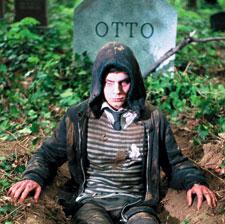Bruce LaBruce had a busy year in 2008. The Toronto writer, artist and filmmaker premiered his new film Otto; or, Up with Dead People in January at the Sundance Film Festival then toured the world with it, then closed the year out with a major retrospective of his films.
Otto, LaBruce’s sixth feature film in a career spanning two decades, is arguably his most mature work, a descriptor that will no doubt turn off some fans. Toning down some of his shock tactics — wound-fucking and roadkill-devouring scenes notwithstanding — and his more outrageous humour, Otto is a sweet, strange film about a hoodied lost boy who may or may not be a zombie.
Otto is the perfect movie to launch a retrospective with, considering that it looks back toward youth while reworking key elements of LaBruce’s prior endeavours. “Otto is a summing-up film for me,” says LaBruce. “It kind of takes narrative ideas or fixations or thematic obsessions from my previous films and rolls them all together.
“I want to move in a different direction after this.”
Two very different narrators recount the film. The first is underground filmmaker Medea Yarn (Katharina Klewinghaus) who is in the middle of making her zombie agit-prop “magnum corpus” called Up with Dead People, which advances the idea that zombies are a “revolution against reality.”
She tells us that what we are watching is taking place in the future, when zombies are common and capable of reason and speech. She also claims that the latest generation of zombies is gay, which has only increased the intense violence inflicted on them by the living.
The other narrator is a young man named Otto (Jey Crisfar) who believes he is a zombie and very well could be. Either way he is suffering from amnesia, with his former life coming back to him only in bits and pieces.
As he staggers about Berlin, he encounters various misadventures as he pieces together his true origins, including falling in with Medea and her cast and crew, and becoming Medea’s latest star.
LaBruce takes a totally unspectacular approach to his subject by suggesting that humans have become so zombified in our “somnambulistic conformist behaviour” that live humans never actually clue in that Otto is undead. (His rigid passivity brings to mind gay icon Joe Dallesandro, who was the dense rock around which the others’ dynamic personalities orbit in Paul Morrissey’s films.)
“Otto sort of represents how I felt when I was a gay teen dealing with a world that is very hostile toward homosexuals and being super-sensitive in a really harsh environment,” says LaBruce. “Medea is more how I feel now. She has a broader political critique that extends beyond the gay world, she makes sense of the world through her art, which makes her more empowered and in control of what she’s doing.”
Though Otto has a pronounced soft side, LaBruce doesn’t find it that much mushier than his past work.
“I think that [emotional] side is almost always there, it’s certainly in No Skin Off My Ass and Super 8 1⁄2, maybe less so in some films. But even in Hustler White, there’s a sentimental aspect to not only the relationship between my character and the hustler but between the other hustlers searching for tenderness in an extremely brutal world.
“Sometimes I think people miss the romantic and tender aspect because of the more obvious kind of brutality of the landscape.”
LaBruce never shied away from sexually explicit material in his work, which many of the edgiest New Queer Cinema directors never ventured into. “It really got noticed because there wasn’t that much of it going on at that time,” he says. “I ran into censorship problems. It was regarded as maybe a resurgence of more daring material that had sort of disappeared since the late ’60s or early ’70s.”
Over the past decade LaBruce has worked a lot in gay porn, but you couldn’t really say that he’s found a home there.
“It is still such a conventional scene so I’m not so convinced at this point about porn being a site of subversion or radicalism. It just seems to almost stay the same or get worse. In terms of the critique presented by Otto — where [porn] is this place that attracts dead and damaged souls — I always argue that that’s its function: It’s the place where you work out a lot of politically incorrect sexual fantasies.”


 Why you can trust Xtra
Why you can trust Xtra


